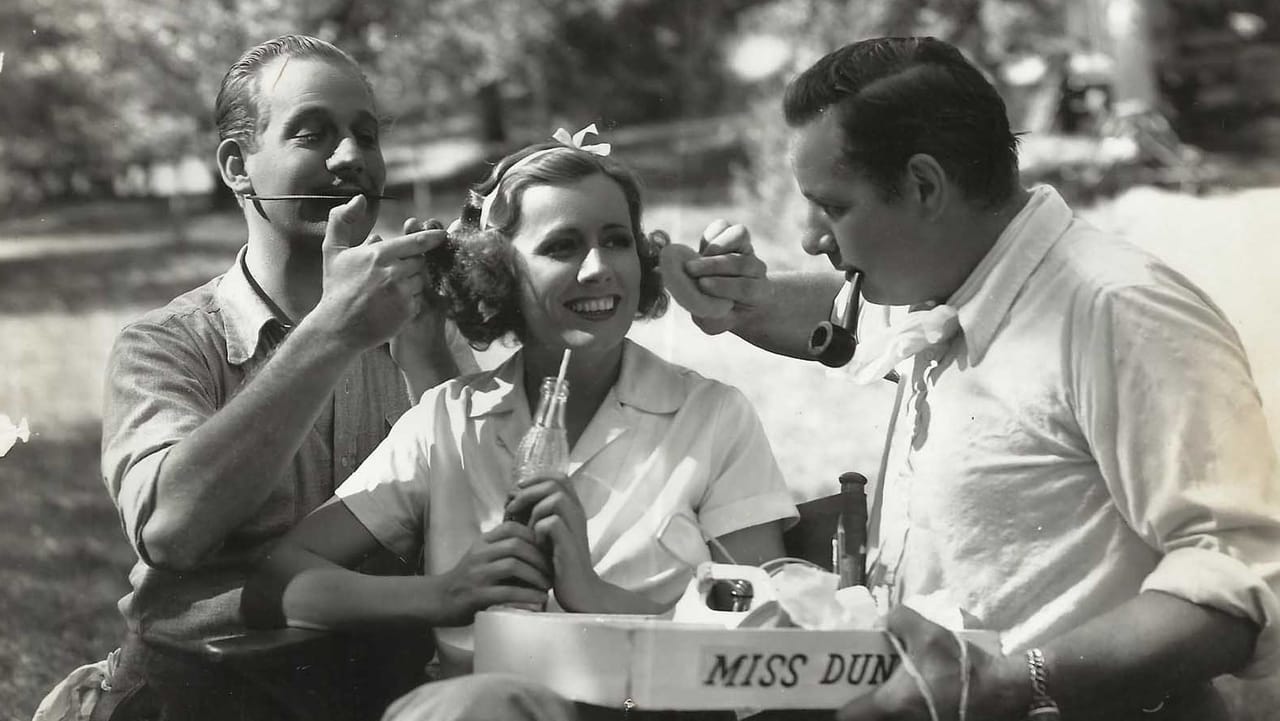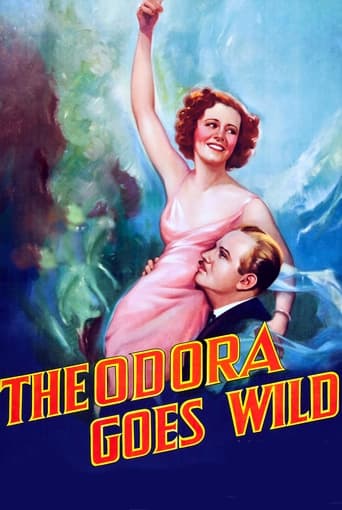



This Movie Can Only Be Described With One Word.
That was an excellent one.
Good start, but then it gets ruined
This movie tries so hard to be funny, yet it falls flat every time. Just another example of recycled ideas repackaged with women in an attempt to appeal to a certain audience.
View MoreEven though this is Lynnsburg Connecticut and not River City Iowa, you'll be tempted to break into a chorus of "Pick a Little, Talk a Little" every time the old biddies of the town's literary committee pick up their party lines either to gossip or listen. You see, one of their own is the author of a scandalous novel that they've been trying to get condemned, and once she has enough of them running her life with their babbity provinciality, she tells them off, leaves for New York, and really gives them something to gossip about."She" is Theodora Lynn (Irene Dunne), the seemingly sweet church organist who is followed by one of the representatives (Melvyn Douglas) of the publishing firm her book was released through, threatening to blow her goody two-shoes image out of the water for good. What's good for the goose is good for the gander, and she turns the tables on him and his upper-crust family. Once Dunne comes out of her shell, she dresses up in outrageous feathered outfits, is named in divorce suits and shows up for a town function with a baby. You really want to see these clucking hens choke on their metamusil once they find out a thing or two or get caught in a vindictive spread of mostly unsubstantiated rumors.Dunne is the whole show and her transition to comedy after musical dramas (like "Sweet Adeline" and "Show Boat") and weepers is the surprise of 1936. She's got a good sparring partner in the whistling Melvyn Douglas. Elisabeth Risdon and Margaret McWade display overly proper dignity with authoritative superiority with Spring Byington the town's big gossip, a flibbertigibbet that is delightfully hypocritical, one of those "church lady" types that needs more time in confession than on the phone. A superb screenplay burlesques the ridiculousness of both small town societies of the 1930's and church lady community groups altogether, reminding audiences comically about the viciousness and destructiveness of "the tongue" and the wages of sin that go with it.
View MoreIrene Dunne plays Theodora Lynn, a proper New England girl. She also happens to go by the name of Caroline Adams. Secluded all her life with her two prudish aunts and the other puritans of the "highly regarded" Lynn Literary Circle, she sublimates her revolt as the secret author of a tantalizing best-selling novel. This is her sublimation of revolt. The movie illustrates the makeover of an allegedly homely and introverted girl into the most wild and high-spirited lady. And it marks a difference between wild and silly, as Uncle John says, "A Lynn may go wild, but never silly." See title for more info on how Theodora goes.She lives in Lynnfield, named after the Lynn family, whose only legacy are Theodora and her two aunts, Elsie and Mary. "The two oracles," says Thomas Mitchell, editor of The Lynnfield Bugle, the "pulse" of the town. It's an enticing note for the movie to start on, a brassy Thomas Mitchell carving out the lovable, spirited personality he'd bring to Stagecoach, fending off puritanical spinsters protesting that the titillating novel he's featuring is not fit to print. Indeed, the members are single-minded not to allow "sexy trash like this come right into our homes and corrupt the morals of our youth." When Mitchell gets to have a word, he blames the community for denying social progress. But the group deems it their obligation to keep Lynnfield the one pure, God-fearing place left in the world.We chuckle knowingly when the action then cuts to New York, where a publisher reads an irate wire from Lynnfield. Theodora is so frantic she thinks Caroline Adams is depraved. Was he raised in a small town by two maiden aunts? Has he lectured Sunday School or played church organ for years? Categorically not. Undaunted, he knows that nobody dumps an audience this big, a career this sensational, due to scruples. That's the reality, one curtailed by Hollywood soon after. But the censors were new and hadn't yet learned to keep its right up, so here we have a forgotten early-sound keepsake of silver-screen censure of moral censorship, frivolous and wacky, but by god not silly.It's this uncensored rebellious energy that I think lends itself to a creative stylishness rare to early American cinema. Short-lived Russian immigrant director Richard Boleslawski brings a particularly effective and stylishly economical editing and visual direction to this appropriately fast-paced early rom-com. Like all the "early rom-coms," its time played a big role in not just its plot but its attitudes, which on the one hand make Theodora Goes Wild refreshingly irreverent but on the other still outmoded in certain varying personal ways. Theodora meets her dapper illustrator, in the form of Melvyn Douglas. Here's a persona who bursts into the movie mugging, blustering and making a domineering nuisance of himself. Theodora opposes his idea of a writer who ought to live life, and so he enlists himself to liberate her. And yet judging this behavior as extraordinarily narcissistic, overbearing and cocky against the alpha male fantasy in romantic comedies of the era would be judging one against a homogeneous crowd.Women were to be rescued, shown the way, wisened up to the real world. And consistent with that role, Theodora is finally inspired by this dashing leader-of-the-pack type to run amok, even exceeding him in mischief and cheek. She now exhibits what he's urged on her so winningly. She relates with dignity how she told the town off: It's a free country, she's an adult and phooey to anyone who judges her for what she does. Indeed, Theodora woos infamy, summoning one outrage after another. But, to her disappointment, beneath his supposedly freethinking facade, Michael is as soft and repressed as she was. Michael is ensnared in a hateful marriage on behalf of his father's political livelihood, and Theodora guarantees to return his favor with a taste of his own juice. Usurping into Michael's apartment, she dresses in feathers and gives shocking interviews to the tabloids. They rotate. Now it's Theodora's task to free him from his bourgeois sense of decorum.Regardless, all that good stuff is just decoration. Actually, it's foundation, but there is a definite, sublime enchantment in its star, Irene Dunne. She played more kinds of roles in more kinds of movies than most of her female peers, and yet is arguably more natural, spontaneous and memorable than any of them. In fact, Theodora Goes Wild is her first comedy. She walks right into it, fully and effortlessly possessed of herself and manages to both be better than all of her female comedy contemporaries and completely different from all of them as well. I'll even go as far as to say that the movies owe more to Dunne than Claudette Colbert, Carole Lombard and Myrna Loy put together. Her Theodora became the forerunner of copious romantic comedies like The Awful Truth and Ninotchka, all anchored in similar principles: the enchanting transformation of their female protagonists. The Awful Truth made a star out of Cary Grant. And in his later co-stars, were looking for Dunne-like qualities. This is her show, and like it always is in such cases, absolutely no one else could've compared.
View MoreI'm not a fan of Irene Dunne because - much like with Katharine Hepburn - she has these affectations in her acting style that you either love or can't stand. To me, she usually seems like she's hoity-toitily overacting. As this movie began, I was pleasantly surprised by Dunne because she was playing a repressed small-town woman and thus didn't produce any of the grand gestures that are typical of her. Those come later (unfortunately), when she "Goes Wild," so to speak. I suppose the flashy role is why she got an Oscar nomination. It's a unique story that plays out unpredictably, and that made it watchable, even if I didn't quite buy the relationship between Dunne and Melvyn Douglas, and found their characters kinda off-putting.
View MoreI have tried to watch this film twice with the identical outcome: I turned it off before it ended. I should add I am a devoted fan of Irene Dunne and slightly less so of Melvyn Douglas but I can't see how these two professionals could have stomached this drivel. It's supposed to be a comedy but there's really nothing funny about it and nobody comes off well. The Lynnfield residents are portrayed as provincial and small-minded while the New Yorkers are portrayed as pushy and inconsiderate alcoholics. Melvyn Douglas is at his most annoying here. There's nothing to redeem him. His character throws himself at Irene Dunne's character and when she flees in terror his reaction is to grin, no leer, as he watches her flight. The only character I found likable was Thomas Mitchell's newspaperman whose attempt to open his fellow citizens' minds is the departure point for this exercise in aggravation. Watch at your own risk.
View More